

Table of Contents
- Money Plant (Pothos)
- Lucky Bamboo
- Jade Plant (Crassula Ovata)
- Peace Lily (Spathiphyllum)
- Snake Plant (Sansevieria)
- Orchids
- Aloe Vera
- Rubber Plant (Ficus Elastica)
- Fern
- Basil
- Lavender
- Rosemary
- Citrus Trees
- Spider Plant (Chlorophytum Comosum)
- English Ivy (Hedera Helix)
- Mint
- Palms
- Bamboo Palm (Chamaedorea Seifrizii)
- Boston Fern (Nephrolepis Exaltata)
- Philodendron
- Eucalyptus
- Chrysanthemum
- Dwarf Banana Plant
- Ficus Tree (Ficus Benjamina)
- Conclusion
- Faq's
Feng Shui, the ancient Chinese practice of harmonizing one's environment, places great emphasis on the energy of plants. Certain indoor plants are believed to bring good luck, prosperity, and positive energy into homes and workplaces. Here's a list of 24 indoor plants that are not only beautiful but also considered auspicious according to Feng Shui principles.
Money Plant (Pothos)
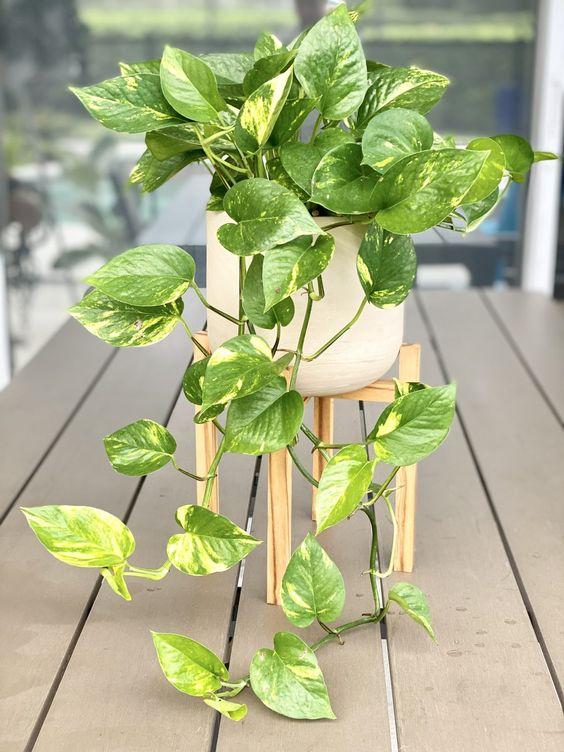 Money Plant
Money Plant
Image Source: Pinterest
The Money Plant, also known as Epipremnum aureum or Devil's Ivy, is highly regarded in Feng Shui for its ability to attract wealth and prosperity. This hardy plant is characterized by its heart-shaped, vibrant green leaves that resemble coins, symbolizing money and financial growth. Here are some tips on how to maximize the positive energy of the Money Plant in your home or office:
Placement
- Southeast Corner: According to Feng Shui principles, placing the Money Plant in the southeast corner of your home or office, known as the wealth corner, can amplify its prosperity-attracting qualities. This area is governed by the Wood element, which the Money Plant naturally complements.
- Entrance Area: Placing the Money Plant near the entrance of your home or office can attract positive energy and prosperity as it welcomes the flow of wealth into the space.
- Work Desk: Keeping a Money Plant on your work desk can enhance your career prospects and attract financial opportunities.
Care Tips
- Light: Money Plants thrive in bright, indirect sunlight but can also tolerate low light conditions, making them ideal for various indoor settings.
- Water: Water the plant when the topsoil feels dry to the touch. Avoid over-watering as it can lead to root rot.
- Humidity: These plants prefer a humid environment. Regular misting or placing the pot on a tray filled with water and pebbles can help maintain the necessary humidity levels.
- Fertilization: Feed the plant with a balanced liquid fertilizer every month during the growing season (spring and summer) to encourage lush growth.
Also Read: How to Select Plants For the Living Room
Lucky Bamboo
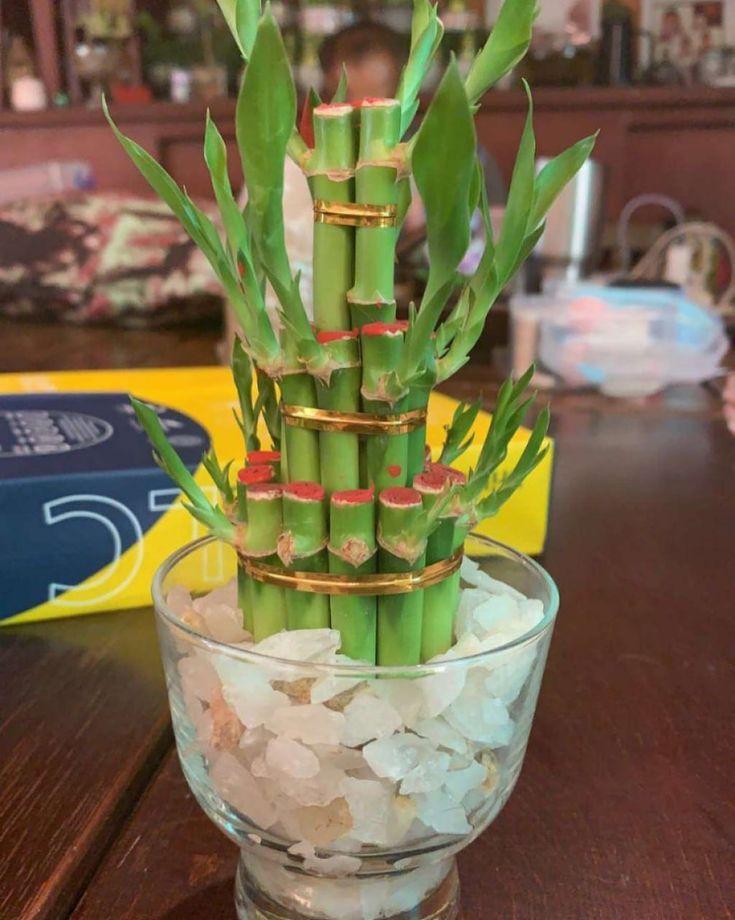 Lucky Bamboo
Lucky Bamboo
Image Source: Pinterest
Lucky Bamboo, scientifically known as Dracaena Sanderiana, is another popular plant in Feng Shui that is believed to bring good luck, fortune, and positive energy. This plant is easy to grow and maintain, making it a favorite choice for homes and offices. Its stalks can be arranged in various numbers and formations, each with its own specific meaning and significance.
Symbolism of Stalk Numbers
- Three Stalks: Represents happiness, long life, and wealth. This combination is considered ideal for attracting overall good fortune.
- Five Stalks: Symbolizes health. Placing a five-stalk arrangement in your home or office is believed to attract positive energy that promotes well-being and physical health.
- Eight Stalks: Associated with wealth and abundance. The number eight is considered very auspicious in Feng Shui as it represents prosperity and success.
- Other Numbers: Different numbers of stalks can symbolize various aspects of life. For example, two stalks represent love and partnership, while six stalks signify good luck and a smooth flow of energy.
Placement
- East or Southeast: Place the Lucky Bamboo in the east for health and family, or in the southeast for wealth and prosperity. These directions align with the Wood element in Feng Shui.
- Living Room or Office Desk: Placing Lucky Bamboo in your living room or on your office desk can enhance the flow of positive energy, bringing harmony and success.
Care Tips
- Light: Lucky Bamboo prefers bright, indirect light. Avoid placing it in direct sunlight as it can scorch the leaves.
- Water: Keep the roots submerged in water at all times. Change the water every two weeks to prevent stagnation and add a few drops of liquid fertilizer every month.
- Container: It can be grown in water-filled containers with pebbles for support or potted in well-draining soil.
- Temperature: Maintain a warm environment, ideally between 65°F and 95°F (18°C to 35°C), to ensure healthy growth.
Jade Plant (Crassula Ovata)
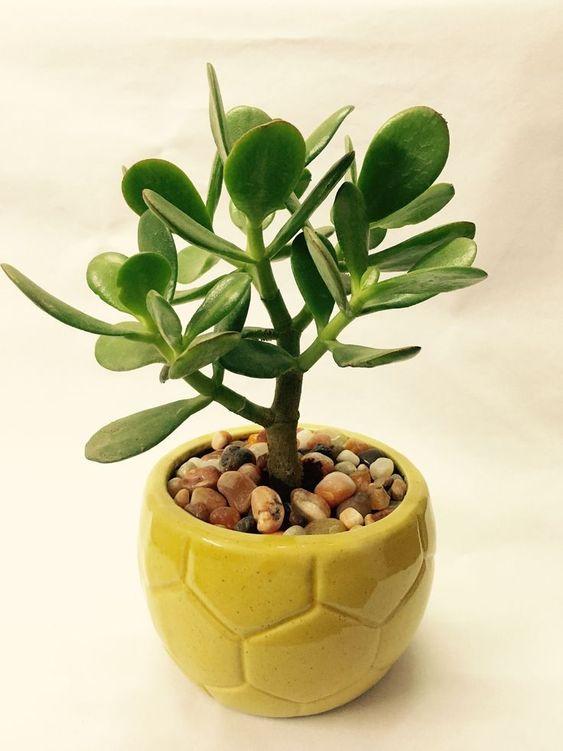 Jade Plant
Jade Plant
Image Source: Pinterest
The Jade Plant, scientifically known as Crassula Ovata, is commonly referred to as the "money tree" due to its round, coin-like leaves that symbolize wealth and prosperity in Feng Shui. This succulent plant is native to South Africa but has become popular worldwide for its auspicious qualities. Here's a closer look at how the Jade Plant can attract wealth and success:
Symbolism and Placement
- Resemblance to Coins: The Jade Plant's leaves are often associated with coins and currency, making it a symbol of financial luck and abundance.
- Entrance Placement: Placing a Jade Plant near the entrance of your home or office is believed to invite positive energy and prosperity into your space. It acts as a welcoming symbol for wealth and success.
- Southwest or Southeast: In Feng Shui, placing the Jade Plant in the southwest (wealth and prosperity area) or southeast (money and abundance area) sectors of your home or office can enhance its wealth-attracting properties.
Care Tips
- Light: Jade Plants prefer bright, indirect sunlight. Ensure they receive adequate light for healthy growth.
- Watering: Allow the soil to dry out between waterings, as overwatering can lead to root rot. Water sparingly during winter months.
- Well-Draining Soil: Use well-draining soil to prevent waterlogging, which can be detrimental to the plant.
- Pruning: Regular pruning can help maintain a compact and bushy appearance, promoting new growth.
Peace Lily (Spathiphyllum)
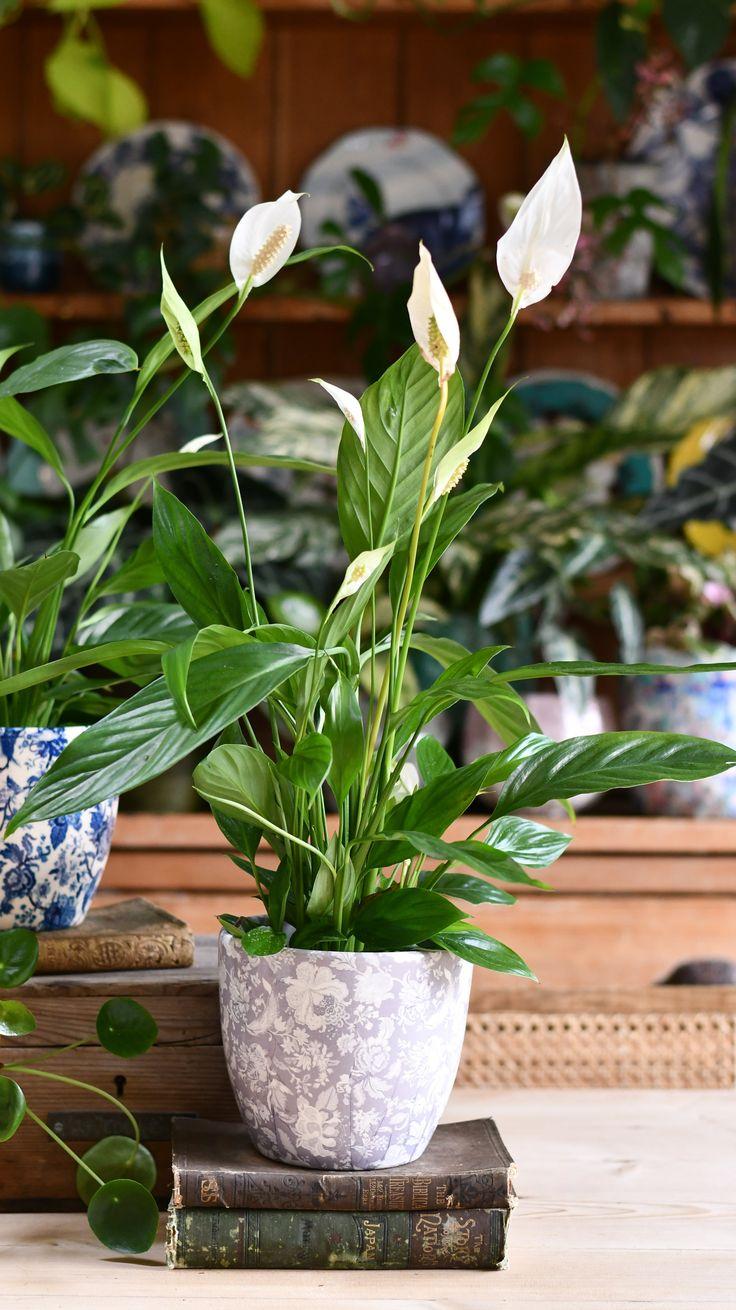 Peace Lily
Peace Lily
Image Source: Pinterest
The Peace Lily, scientifically known as Spathiphyllum, is valued for its elegant white blooms and its ability to bring peace and harmony to indoor spaces. Here are the key aspects of the Peace Lily's symbolism and care:
Symbolism and Benefits
- White Blooms: The white flowers of the Peace Lily symbolize purity, peace, and spiritual harmony. They are often associated with calmness and serenity.
- Air Purification: Peace Lilies are excellent air purifiers, removing toxins such as formaldehyde, benzene, and carbon monoxide from indoor environments. This contributes to a healthier and more harmonious living space.
- Emotional Well-Being: Having Peace Lilies in your home can promote a sense of tranquility and emotional well-being, making them ideal for bedrooms, living rooms, or meditation areas.
Care Tips
- Light: Peace Lilies prefer indirect, filtered sunlight. Avoid placing them in direct sunlight, which can scorch their leaves.
- Watering: Keep the soil evenly moist but not soggy. Water when the top inch of soil feels dry.
- Humidity: These plants appreciate high humidity levels. Misting the leaves or placing a tray of water and pebbles nearby can help increase humidity.
- Temperature: Maintain a room temperature between 65°F to 80°F (18°C to 27°C) for optimal growth.
Snake Plant (Sansevieria)
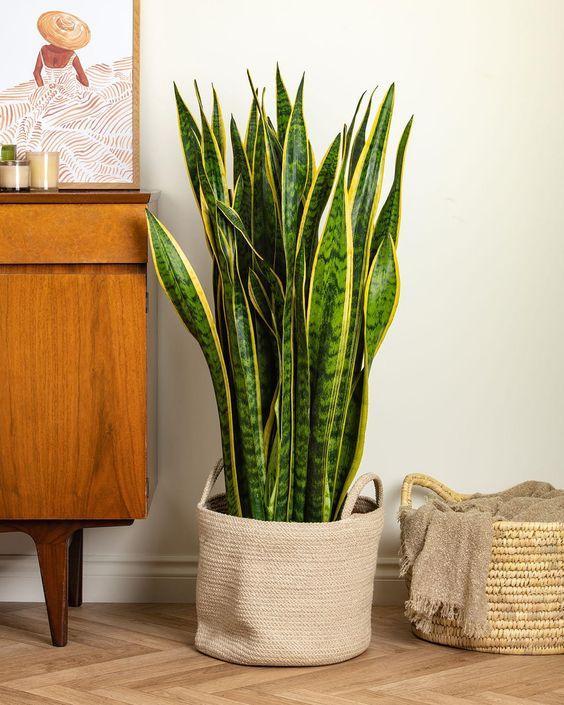 Snake Plant
Snake Plant
Image Source: Pinterest
The Snake Plant, also known as Sansevieria or mother-in-law's tongue, is renowned for its hardiness, air-purifying properties, and protective energy. Here's why it's a beneficial addition to your bedroom for a restful night's sleep:
Also Read: Shami Plant: How to Grow, Vastu & Spiritual Benefits, Placement & Care
Symbolism and Benefits
- Purifying Qualities: Snake Plants are exceptional air purifiers, removing toxins such as formaldehyde, benzene, and xylene from indoor air. This can lead to improved air quality and a healthier environment, which is crucial for quality sleep.
- Oxygen Production: Unlike most plants that release oxygen during the day, Snake Plants continue to produce oxygen at night, making them ideal bedroom companions for fresh, oxygen-rich air.
- Low Maintenance: Snake Plants are drought-tolerant and can thrive in low-light conditions, making them perfect for bedrooms with minimal natural light.
- Protective Energy: In Feng Shui, the Snake Plant is believed to have protective qualities, guarding against negative energies and promoting a sense of security and calmness.
Placement and Care Tips
- Bedroom Placement: Place Snake Plants in your bedroom, preferably near the foot of the bed or on a bedside table, to benefit from their air-purifying and calming effects.
- Light: While Snake Plants can tolerate low light, they prefer indirect sunlight. Avoid exposing them to direct sunlight for prolonged periods.
- Watering: Allow the soil to dry out between waterings to prevent root rot. Water sparingly, especially during winter when the plant is in a dormant phase.
- Well-Draining Soil: Use well-draining soil to prevent waterlogging, as Snake Plants are susceptible to root rot in overly moist conditions.
Orchids
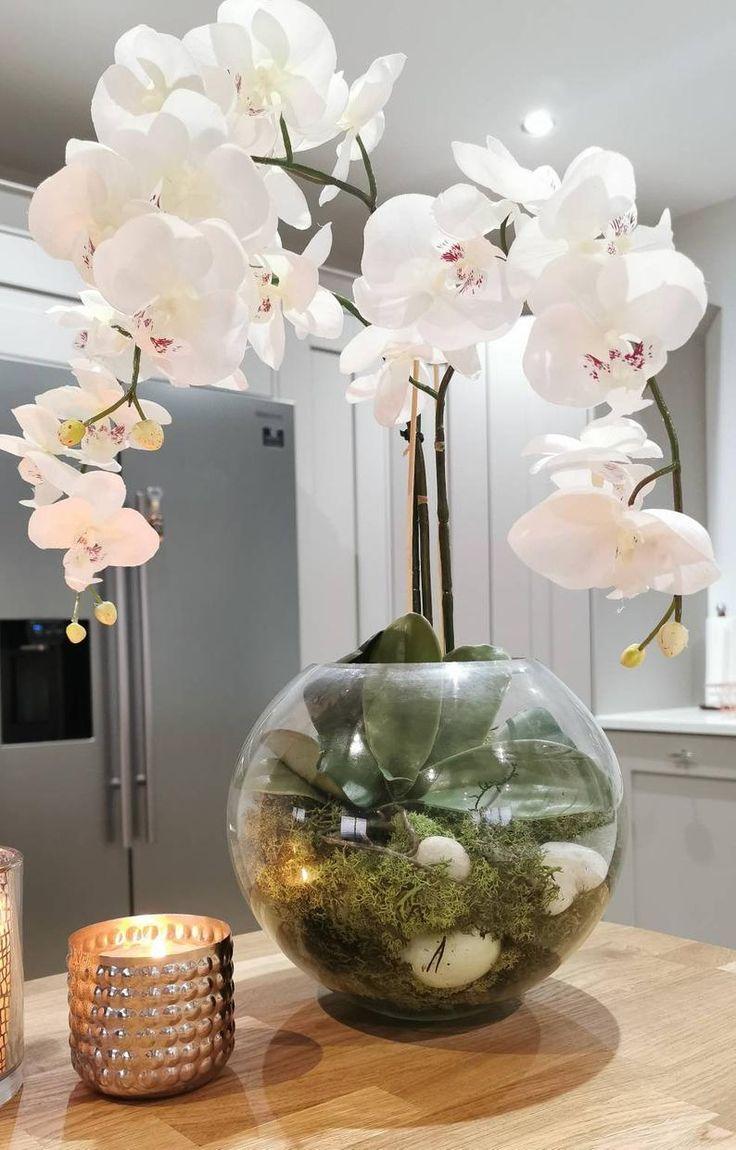 Orchids
Orchids
Image Source: Pinterest
Orchids are not just beautiful flowers but also hold significant symbolism in various cultures, including in Feng Shui. Here's an expansion on their symbolism and benefits:
Symbolism and Meaning
- Fertility and Prosperity: Orchids symbolize fertility, making them a popular choice for couples seeking blessings for fertility and abundance in their lives.
- Abundance and Luxury: Their elegant blooms and exotic appearance represent abundance, luxury, and opulence. Placing orchids in your home or office can invite a sense of richness and prosperity.
- Tranquility and Serenity: Orchids are known for their calming effect and ability to bring a sense of peace and tranquility to any space. They can enhance the ambiance of a room with their delicate beauty and soothing presence.
Care Tips
- Light: Orchids thrive in bright, indirect light. Avoid direct sunlight, as it can damage their delicate petals.
- Watering: Orchids require regular but moderate watering. Allow the growing medium (bark or moss) to dry slightly between waterings to prevent root rot.
- Humidity: Maintain a humid environment for orchids, especially if you live in a dry climate. Misting the leaves or placing a humidity tray nearby can help.
- Temperature: Orchids prefer temperatures between 60°F to 80°F (15°C to 27°C) during the day and slightly cooler at night.
Aloe Vera
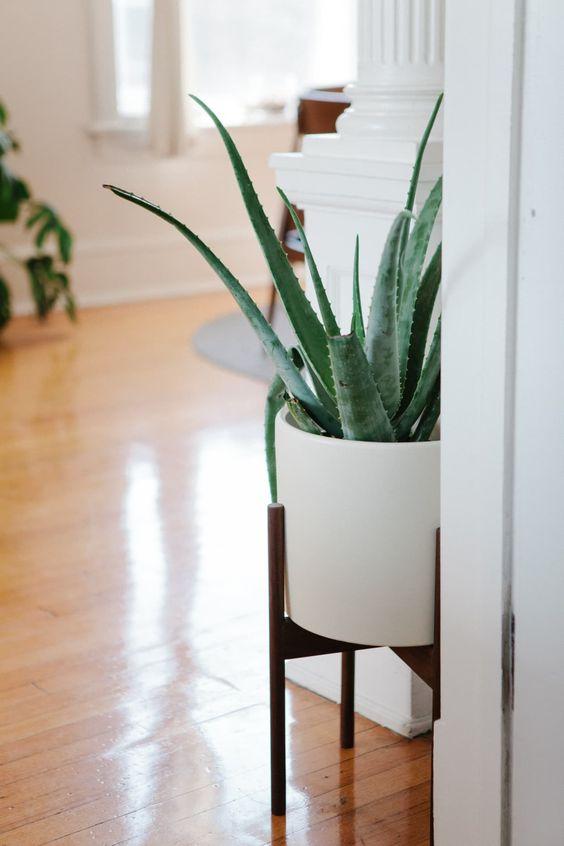 Aloe Vera
Aloe Vera
Image Source: Pinterest
Aloe Vera is not just a decorative plant but a powerhouse of benefits for both physical and metaphysical well-being. Here's an expansion on its significance and advantages:
Symbolism and Benefits
- Warding Off Negative Energy: Aloe Vera is believed to possess protective properties that ward off negative energy and bad luck. Placing an Aloe Vera plant in your home is thought to create a shield of positive energy.
- Health Benefits: Aloe Vera is renowned for its medicinal properties, including its ability to soothe skin irritations, promote healing, and even purify the air. Its presence can contribute to a healthier living environment.
- Overall Well-Being: Aloe Vera is associated with vitality, rejuvenation, and growth. Its robust nature and ability to thrive in various conditions symbolize resilience and well-being.
Care Tips
- Light: Aloe Vera prefers bright, indirect sunlight. However, it can also tolerate low light conditions, making it suitable for indoor settings.
- Watering: Allow the soil to dry out between waterings to prevent waterlogging. Aloe Vera plants are drought-tolerant and prefer slightly dry conditions.
- Soil and Potting: Use well-draining soil or a cactus/succulent mix to ensure proper drainage. Aloe Vera plants do well in terra cotta pots that allow excess moisture to escape.
- Harvesting: You can benefit from Aloe Vera's gel by harvesting it for skincare or medicinal purposes. Simply cut a leaf and extract the gel for topical application.
Rubber Plant (Ficus Elastica)
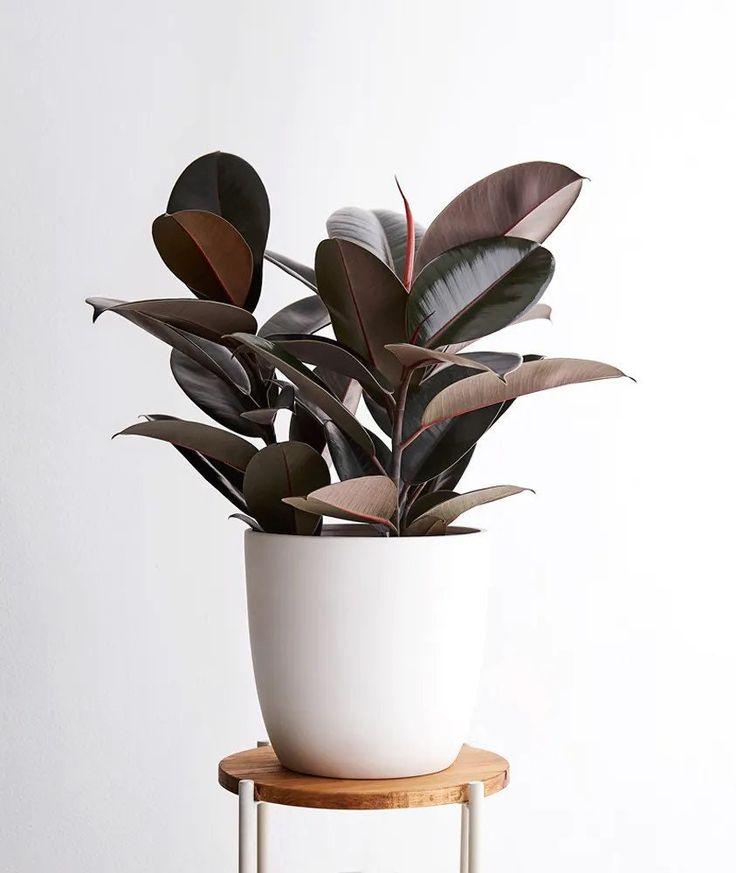 Rubber Plant
Rubber Plant
Image Source: Pinterest
The Rubber Plant, scientifically known as Ficus elastica, is a symbol of prosperity and abundance in Feng Shui. Here's an expansion on its significance and how it attracts wealth and good fortune:
Symbolism and Benefits
- Wealth and Prosperity: The large, round leaves of the Rubber Plant symbolize financial abundance and prosperity. Placing this plant in your home or office is believed to attract wealth and good fortune.
- Positive Energy: Rubber Plants are associated with positive energy and growth. Their vibrant green foliage can uplift the energy of a space and promote a sense of well-being.
- Indoor Air Purification: Like other ficus plants, the Rubber Plant is an excellent air purifier, helping to remove toxins and improve indoor air quality. This contributes to a healthier living environment.
Care Tips
- Light: Rubber Plants prefer bright, indirect sunlight. Avoid placing them in direct sunlight, as it can scorch their leaves.
- Watering: Water the plant moderately, allowing the soil to dry out slightly between waterings. Overwatering can lead to root rot.
- Humidity: Rubber Plants thrive in moderately humid conditions. Misting the leaves or placing the plant near a humidifier can be beneficial, especially in dry climates.
- Pruning and Maintenance: Regular pruning can help maintain a bushy appearance and promote new growth. Wipe the leaves occasionally to keep them free from dust.
Fern
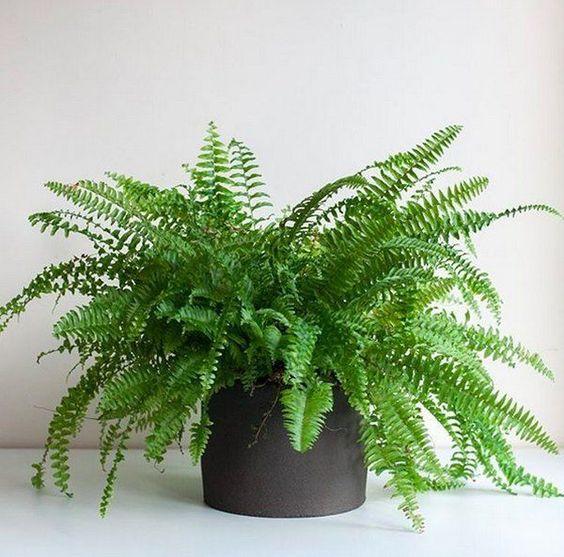 Fern
Fern
Image Source: Pinterest
Ferns are ancient plants known for their lush, green foliage and their ability to thrive in humid environments. Here's an expansion on their symbolism and benefits, especially when placed in areas like bathrooms:
Symbolism and Benefits
- Freshness and Rejuvenation: Ferns symbolize renewal, freshness, and vitality. Their vibrant green leaves can uplift the energy of a space and promote a sense of rejuvenation.
- Humidity Regulation: Ferns thrive in humid environments, making them ideal for bathrooms and other areas with higher moisture levels. They can help maintain balanced humidity and improve indoor air quality.
- Natural Beauty: The delicate fronds and intricate patterns of ferns add a touch of natural beauty to indoor spaces. They create a soothing and harmonious atmosphere.
- Low Maintenance: Many fern varieties are relatively low maintenance and can tolerate indirect light, making them suitable for various indoor settings.
Care Tips
- Light: Ferns prefer indirect or filtered sunlight. Too much direct sunlight can scorch their delicate leaves.
- Watering: Keep the soil consistently moist but not waterlogged. Mist the leaves occasionally to mimic their natural habitat and increase humidity.
- Humidity: Place ferns in areas with higher humidity levels, such as bathrooms or near humidifiers. Grouping them together can also help create a microclimate of moisture.
- Potting Medium: Use well-draining, peat-based soil for ferns to prevent water stagnation.
Basil
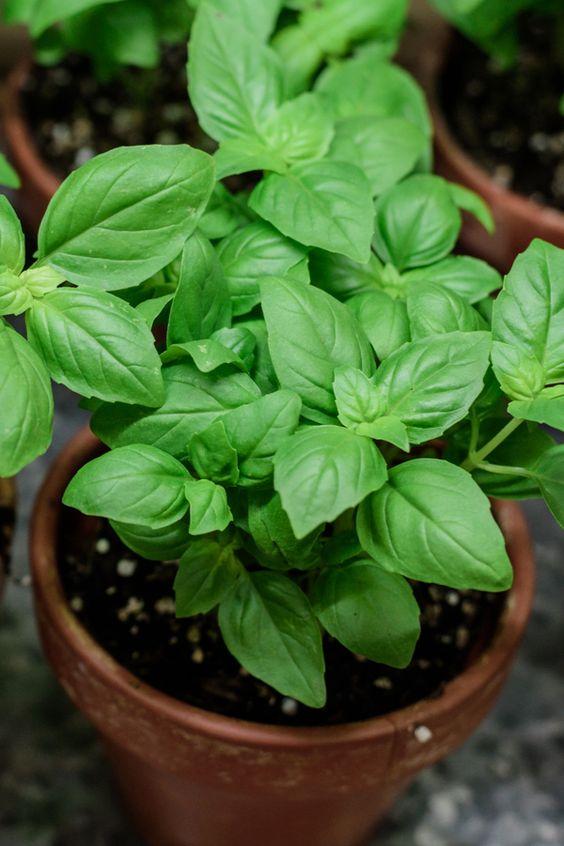 Basil
Basil
Image Source: Pinterest
Basil, known scientifically as Ocimum basilicum, is not only a culinary herb but also holds significant cultural and spiritual symbolism. Here's an expansion on its symbolism and benefits beyond its culinary uses:
Symbolism and Benefits
- Sacredness and Protection: Basil is considered sacred in many cultures, including Indian traditions. It is believed to ward off negative energies, bring good luck, and offer protection to the household.
- Aromatherapy Benefits: The fragrance of basil leaves promotes a sense of calmness, clarity, and positivity. It is often used in aromatherapy and herbal remedies for its mood-enhancing properties.
- Culinary and Medicinal Uses: Basil is not just a flavorful herb but also offers various health benefits. It contains antioxidants, vitamins, and essential oils that support overall well-being.
- Easy to Grow: Basil is relatively easy to grow indoors, making it a popular choice for home gardens and kitchen windowsills.
Care Tips
- Light: Basil prefers plenty of sunlight. Place it in a sunny window where it can receive at least 6-8 hours of sunlight daily.
- Watering: Keep the soil evenly moist but not waterlogged. Water when the top inch of soil feels dry to the touch.
- Pruning: Regularly prune basil to encourage bushy growth and prevent it from flowering too soon. Pinch off flower buds to prolong the plant's life.
- Harvesting: Harvest basil leaves as needed for culinary purposes. This also encourages new growth and keeps the plant healthy.
Lavender
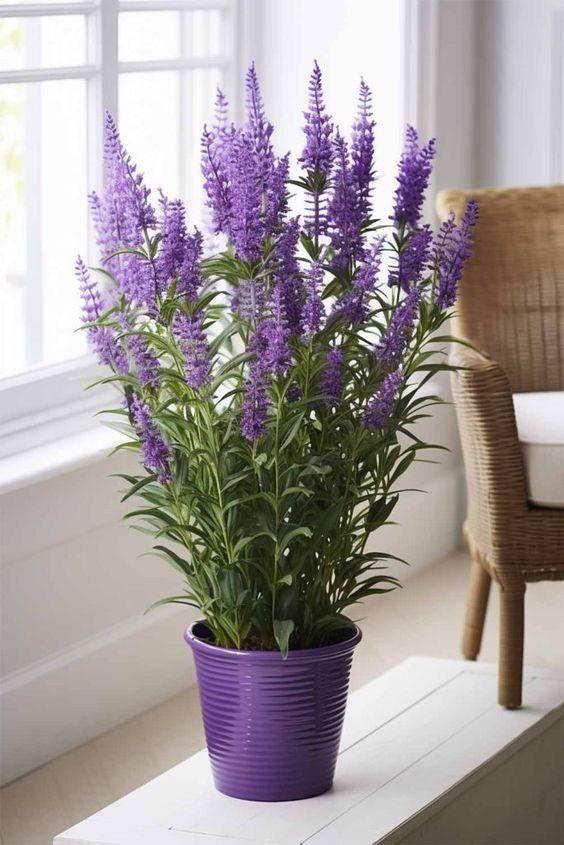 Lavender
Lavender
Image Source: Pinterest
Lavender, known for its fragrant purple blooms and soothing aroma, is cherished for its calming properties and versatile uses. Here's an expansion on its symbolism and benefits:
Symbolism and Benefits
- Calming and Relaxing: Lavender is renowned for its calming effects on the mind and body. Its aroma promotes relaxation, reduces stress, and helps improve sleep quality.
- Aromatherapy and Wellness: Lavender essential oil is widely used in aromatherapy for its therapeutic benefits. It can alleviate anxiety, headaches, and promote overall well-being.
- Spiritual Cleansing: Lavender is associated with purification and spiritual cleansing. Burning dried lavender or using lavender sachets can clear negative energy and promote a harmonious environment.
- Natural Beauty and Pollinator: Lavender plants not only add beauty to gardens and indoor spaces but also attract pollinators like bees and butterflies, contributing to ecosystem health.
Care Tips
- Light: Lavender prefers full sun and well-draining soil. Place it in a sunny location, such as a south-facing window or outdoors in a garden.
- Watering: Allow the soil to dry out between waterings to prevent root rot. Lavender plants are drought-tolerant once established and prefer slightly dry conditions.
- Pruning: Regularly trim spent flowers and prune lavender plants to maintain their shape and encourage new growth.
- Harvesting: Harvest lavender blooms for drying and crafting purposes. Dried lavender can be used in sachets, potpourri, or as herbal tea.
Also Read: Vastu-Friendly Plants and Which Ones to Avoid
Rosemary
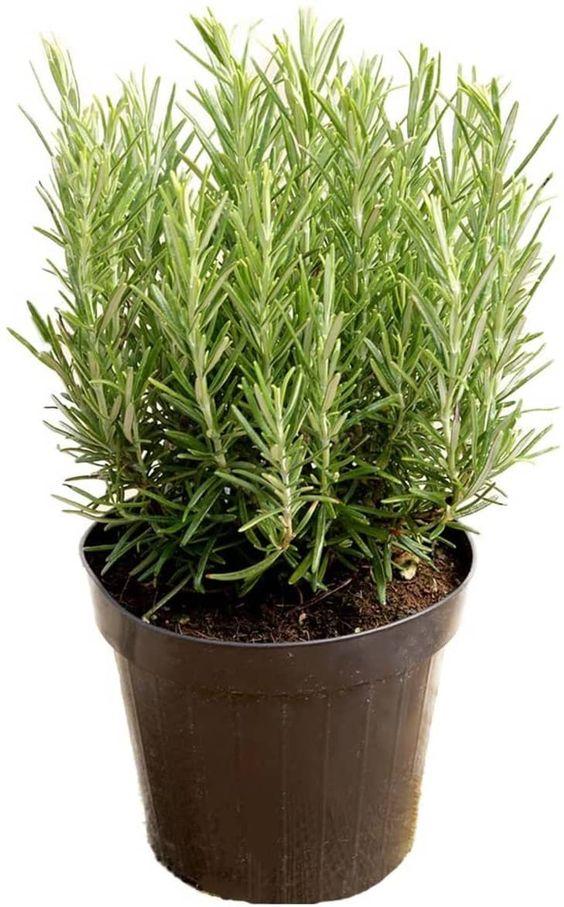
Image Source: Pinterest
Rosemary (Rosmarinus officinalis) is not just a culinary herb but also carries deep symbolism and beneficial qualities. Here's an expansion on its significance and advantages:
Symbolism and Benefits
- Love and Happiness: Rosemary is associated with love, happiness, and fidelity in various cultures. It has historically been used in weddings and celebrations to symbolize loyalty and devotion.
- Purifying Properties: Rosemary is known for its purifying qualities. Its aromatic leaves can cleanse the air and promote a sense of freshness in indoor spaces.
- Culinary Uses: Beyond its symbolic meanings, rosemary is a versatile herb used in cooking. Its fragrant leaves add flavor to dishes such as roasted meats, vegetables, and marinades.
- Aromatherapy: The scent of rosemary is invigorating and can stimulate the senses. It is sometimes used in aromatherapy for mental clarity and focus.
Care Tips
- Light and Soil: Rosemary thrives in well-draining soil and prefers full sun or bright light. Ensure it receives at least 6-8 hours of sunlight daily.
- Watering: Allow the soil to dry out slightly between waterings. Rosemary is drought-tolerant once established and prefers slightly dry conditions.
- Pruning: Regularly prune rosemary to maintain its shape and encourage bushy growth. Trim off dead or woody branches to promote new growth.
- Harvesting: Harvest rosemary sprigs as needed for culinary use. Fresh or dried rosemary leaves can be used in cooking, teas, or infused oils.
Citrus Trees
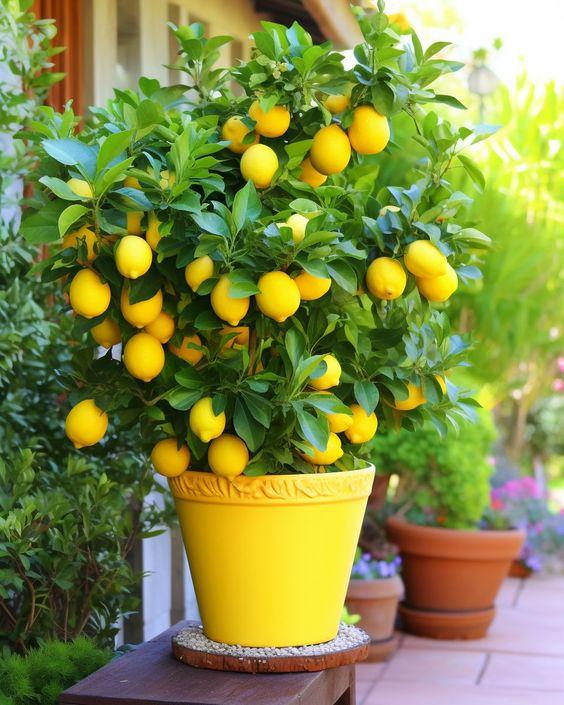 Citrus Tree
Citrus Tree
Image Source: Pinterest
Citrus trees, such as lemon or orange trees, symbolize abundance, prosperity, and good fortune. Here's an expansion on their symbolism and benefits:
Symbolism and Benefits
- Abundance and Wealth: Citrus fruits are symbols of abundance and prosperity in many cultures. Having citrus trees in your home or garden is believed to attract wealth and good fortune.
- Fragrance and Beauty: Citrus trees not only produce delicious fruits but also have fragrant flowers that add beauty and charm to outdoor or indoor spaces.
- Health Benefits: Citrus fruits are rich in vitamin C and antioxidants, promoting immune health and overall well-being.
- Aesthetic Appeal: Whether grown in pots or garden beds, citrus trees enhance the aesthetic appeal of your surroundings with their glossy leaves and colorful fruits.
Care Tips
- Sunlight and Temperature: Citrus trees thrive in full sun and warm climates. Provide them with at least 6-8 hours of direct sunlight daily.
- Watering and Soil: Keep the soil evenly moist but not waterlogged. Use well-draining soil and water citrus trees regularly, especially during hot and dry periods.
- Fertilization: Feed citrus trees with a balanced citrus fertilizer according to package instructions to support healthy growth and fruit production.
- Pruning: Prune citrus trees to remove dead or diseased branches and promote airflow. Pruning can also shape the tree and improve fruit quality.
Spider Plant (Chlorophytum Comosum)
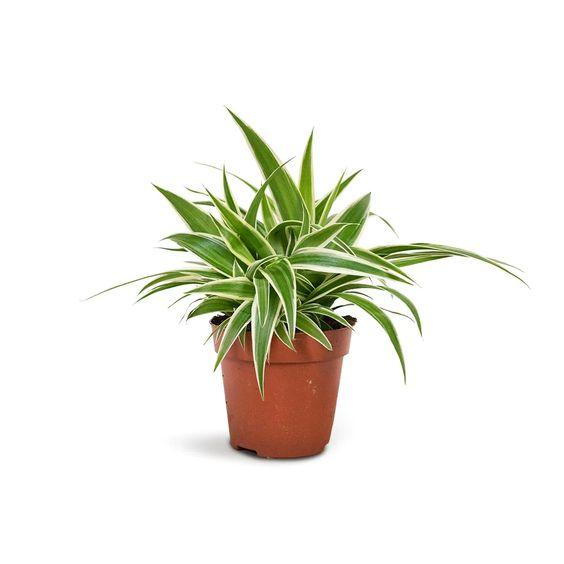 Spider Plant
Spider Plant
Image Source: Pinterest
Spider Plants are not just visually appealing but also carry positive energy and air-purifying qualities. Here's an expansion on their symbolism and benefits:
Symbolism and Benefits
- Good Luck and Positive Energy: Spider Plants are believed to bring good luck and positive energy to a home. They are associated with prosperity and vitality.
- Air Purification: Spider Plants are excellent air purifiers. They help remove toxins such as formaldehyde and carbon monoxide from indoor air, promoting a healthier living environment.
- Easy Care: Spider Plants are low maintenance and adaptable to various light conditions. They produce offsets or "spiderettes" that can be propagated to create new plants.
- Aesthetic Value: The arching leaves of Spider Plants add a touch of greenery and elegance to indoor spaces. They are suitable for hanging baskets or tabletop planters.
Care Tips
- Light and Watering: Spider Plants thrive in indirect or moderate light. Keep the soil evenly moist but not waterlogged. They prefer a well-draining potting mix.
- Propagation: Spider Plants produce baby plants (spiderettes) that can be rooted in water or soil to create new plants. This propagation method is easy and fun.
- Pest Control: Monitor for pests such as spider mites or aphids, especially in dry indoor conditions. Regularly wiping the leaves with a damp cloth can help deter pests.
English Ivy (Hedera Helix)
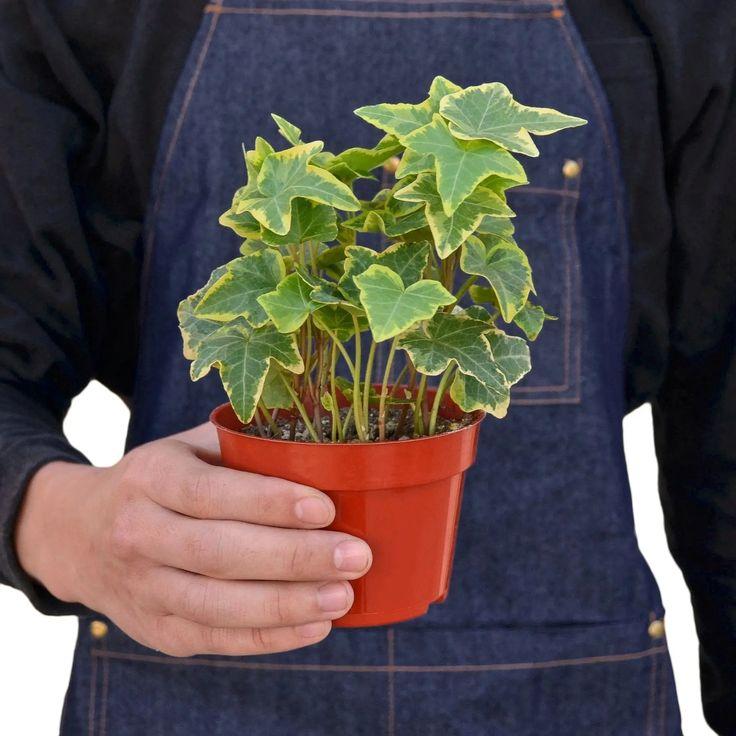 English Ivy
English Ivy
Image Source: Pinterest
English Ivy is a classic choice for both indoor and outdoor settings, known for its elegance and air-purifying qualities. Here's an expansion on its symbolism and benefits:
Symbolism and Benefits
- Negative Energy Cleansing: English Ivy is known for its ability to eliminate negative energy and create a calming and peaceful environment. It is often used in Feng Shui for its protective qualities.
- Air Purification: Like Spider Plants, English Ivy is an excellent air purifier. It helps remove indoor pollutants and improve air quality, making it beneficial for homes and offices.
- Versatile Growth: English Ivy can be grown as a trailing vine or trained to climb walls, trellises, or topiaries. Its lush green foliage adds a touch of natural beauty to any space.
- Low Light Tolerance: English Ivy can tolerate low light conditions, although it thrives best in moderate to bright indirect light.
Care Tips
- Light and Watering: English Ivy prefers moderate to bright indirect light. Keep the soil evenly moist but not waterlogged. Allow the top inch of soil to dry out between waterings.
- Pruning and Maintenance: Trim overgrown or leggy stems to encourage bushier growth and prevent tangling. Regularly inspect for pests and remove any dead or yellowing leaves.
- Support for Climbing: If you're growing English Ivy as a climber, provide support such as a trellis or moss pole for the vines to cling to.
- Propagation: English Ivy can be propagated from stem cuttings placed in water or soil. Propagating new plants is a great way to expand your ivy collection or share with friends.
Mint
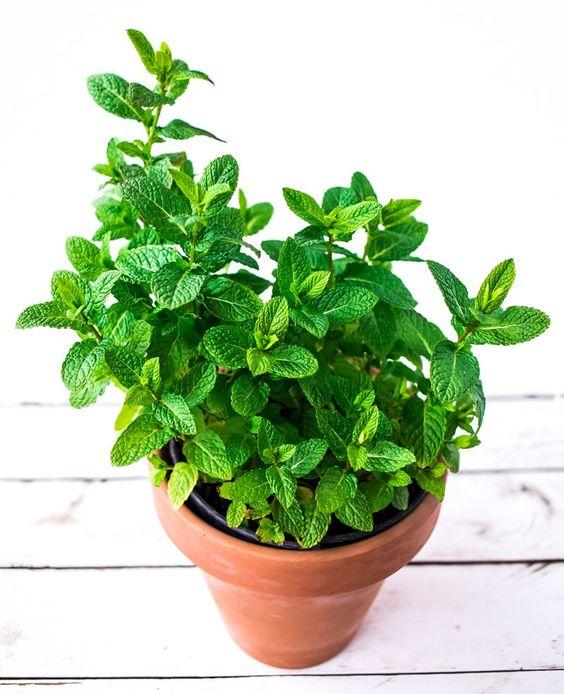 Mint
Mint
Image Source: Pinterest
Mint plants, known for their refreshing aroma and culinary versatility, hold symbolic significance and practical benefits. Here's an expansion on their symbolism and advantages:
Symbolism and Benefits
- Wealth and Prosperity: Mint plants are believed to attract wealth and improve financial stability according to folklore. Their lush growth and vibrant green leaves symbolize abundance and prosperity.
- Fresh Aroma: Mint plants emit a fresh, invigorating scent that can uplift moods and create a pleasant ambiance in your home. The aromatic leaves can be used in cooking, teas, and natural remedies.
- Culinary and Medicinal Uses: Mint is a popular herb used in culinary dishes, beverages, and herbal remedies. It adds flavor to salads, desserts, drinks, and can also aid in digestion and relaxation.
- Easy to Grow: Mint is relatively easy to grow indoors or outdoors. It thrives in moist, well-draining soil and prefers partial shade or indirect sunlight.
Care Tips
- Light and Watering: Mint plants prefer partial shade to full sun. Keep the soil evenly moist but not waterlogged. Regular harvesting helps promote bushy growth.
- Container Growing: Plant mint in a container to control its spread, as it can become invasive in garden beds. Choose a pot with drainage holes and rich, loamy soil.
- Harvesting: Trim mint stems regularly to encourage new growth and prevent legginess. Fresh mint leaves can be used immediately or dried for later use.
Palms
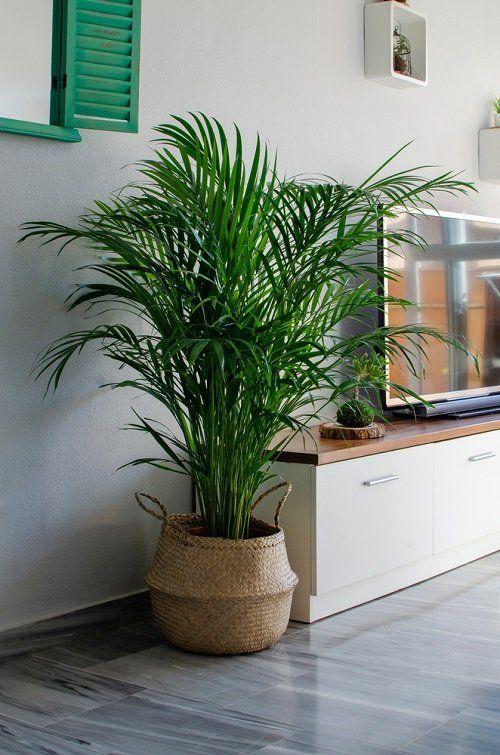 Palms
Palms
Image Source: Pinterest
Palms are iconic plants associated with peace, prosperity, and a tropical ambiance. Here's an expansion on their symbolism and benefits:
Symbolism and Benefits
- Peace and Serenity: Palms are often associated with peace and relaxation due to their tropical appearance and soothing greenery. They create a sense of tranquility in indoor and outdoor spaces.
- Prosperity and Growth: Palms symbolize prosperity and growth, making them popular choices for homes and offices seeking positive energy and success.
- Aesthetic Appeal: The large, fan-like leaves of palms add a touch of natural elegance to interiors and landscapes. They are versatile and can be grown in various sizes and varieties.
- Air Purification: Some palm species, such as the Areca Palm, are excellent air purifiers. They help remove toxins and improve indoor air quality.
Care Tips
- Light and Watering: Palms thrive in bright, indirect light but can tolerate lower light conditions. Water palms regularly but allow the soil to dry slightly between waterings to prevent root rot.
- Humidity: Palms appreciate moderate to high humidity levels, especially if grown indoors. Regular misting or placing the plant near a humidifier can help maintain humidity.
- Pruning: Trim brown or yellowing fronds to promote new growth and maintain a tidy appearance. Use sharp, clean pruners to avoid damaging the plant.
- Potting and Soil: Use a well-draining potting mix for palms and choose a container with drainage holes. Repot palms as needed to provide ample space for root growth.
Bamboo Palm (Chamaedorea Seifrizii)
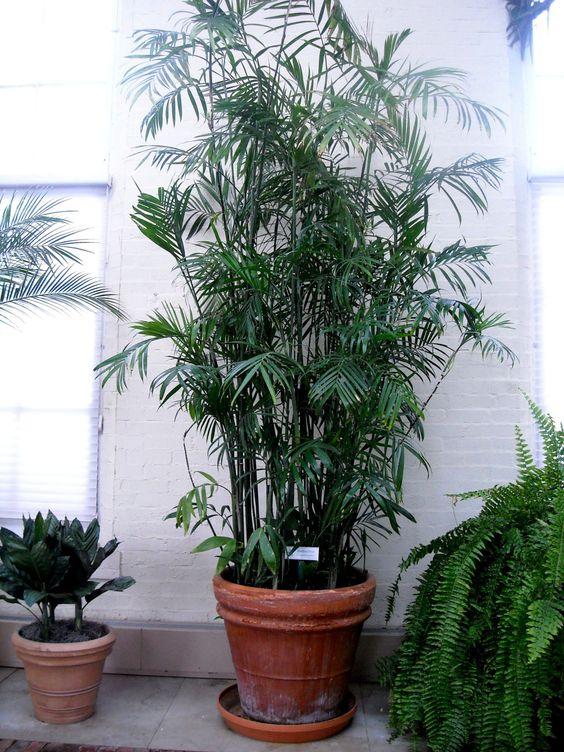 Bamboo Palm
Bamboo Palm
Image Source: Pinterest
The Bamboo Palm, also known as the Reed Palm, is a symbol of wealth and good fortune. Here's an expansion on its symbolism and benefits:
Symbolism and Benefits
- Wealth and Prosperity: Bamboo Palms are associated with wealth, prosperity, and good fortune in Feng Shui and other cultural beliefs. Their graceful appearance and lush foliage symbolize abundance.
- Air Purification: Like other palms, Bamboo Palms are excellent air purifiers. They help remove indoor pollutants and create a healthier living environment.
- Tropical Aesthetic: Bamboo Palms add a tropical and exotic touch to interiors. They are popular for creating indoor jungle or tropical-themed spaces.
- Low Maintenance: Bamboo Palms are relatively low maintenance and can adapt to various light conditions. They are suitable for homes, offices, and indoor landscapes.
Care Tips
- Light and Watering: Bamboo Palms prefer bright, indirect light but can tolerate lower light conditions. Water them regularly but allow the soil to dry slightly between waterings.
- Humidity and Temperature: Maintain moderate humidity levels for Bamboo Palms, especially in drier indoor environments. They thrive in temperatures between 65°F to 80°F (18°C to 27°C).
- Fertilization: Feed Bamboo Palms with a balanced liquid fertilizer during the growing season (spring and summer) to support healthy growth.
- Pest Control: Monitor for pests such as spider mites or mealybugs. Regularly inspect the plant and treat any infestations promptly.
Boston Fern (Nephrolepis Exaltata)
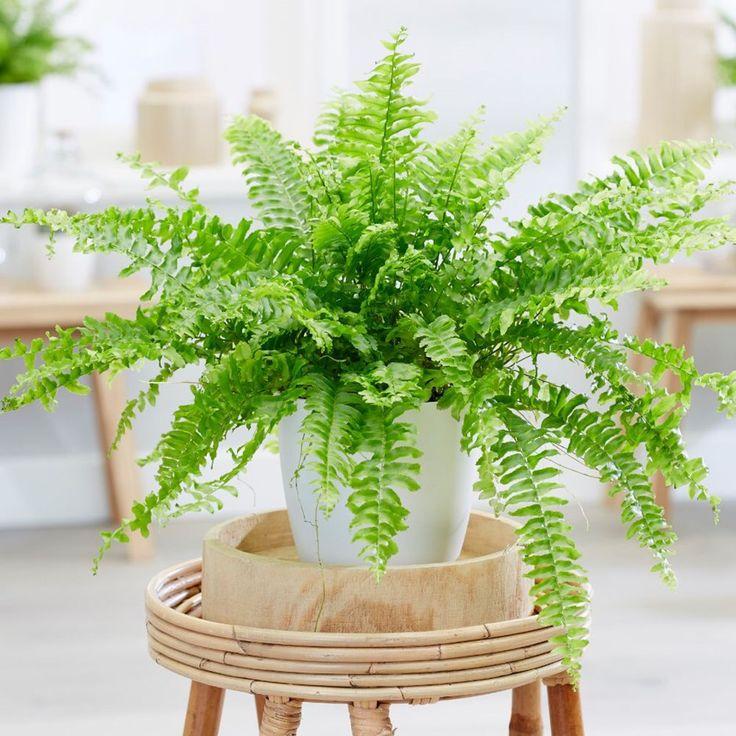 Boston Fern
Boston Fern
Image Source: Pinterest
Boston Ferns are renowned for their lush, feathery fronds and air-purifying qualities. Here's an expansion on their symbolism and benefits:
Symbolism and Benefits
- Calming and Serene Environment: Boston Ferns are known to create a calm and serene atmosphere with their lush green foliage and graceful arching fronds. They add a touch of nature's tranquility to indoor spaces.
- Air Purification: Boston Ferns are excellent air purifiers. They help remove toxins such as formaldehyde and xylene from indoor air, promoting a healthier living environment.
- Humidity Regulation: Boston Ferns thrive in humid environments, making them ideal for bathrooms or areas with higher moisture levels. They help add humidity to indoor spaces.
- Versatile Use: Boston Ferns can be grown in hanging baskets, pots, or as part of indoor garden displays. They are suitable for shaded or partially shaded areas.
Care Tips
- Light and Watering: Boston Ferns prefer indirect or filtered light and consistently moist soil. Water them regularly to keep the soil evenly moist, especially during warmer months.
- Humidity: Maintain moderate to high humidity levels for Boston Ferns, especially if grown indoors. Mist the fronds or place the plant near a humidifier to increase humidity.
- Temperature and Airflow: Boston Ferns thrive in temperatures between 60°F to 75°F (15°C to 24°C) and appreciate good airflow to prevent fungal issues. Avoid placing them near drafts or vents.
- Pruning and Maintenance: Trim brown or dead fronds regularly to promote new growth and maintain the plant's health and appearance. Inspect for pests and treat as needed.
Philodendron
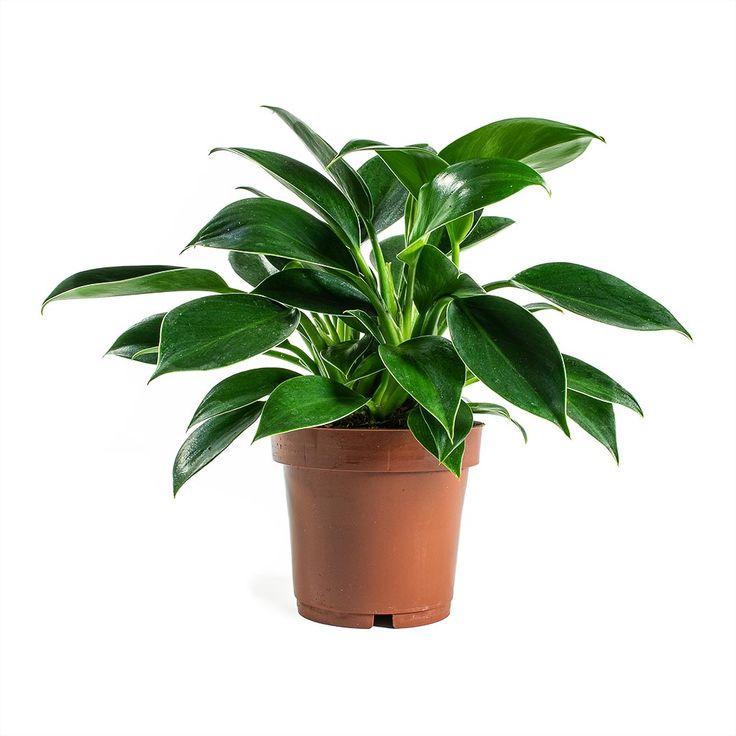 Philodendron
Philodendron
Image Source: Pinterest
Philodendrons are popular indoor plants known for their lush foliage and easy care. Here's an expansion on their symbolism and benefits:
Symbolism and Benefits
- Growth and Abundance: Philodendrons are believed to bring growth, abundance, and prosperity to the home. Their vigorous growth and thriving nature symbolize prosperity and progress.
- Heart-Shaped Leaves: The heart-shaped leaves of philodendrons symbolize love, compassion, and emotional well-being. They can add a touch of warmth and positivity to indoor spaces.
- Air Purification: Philodendrons are effective air purifiers, helping remove toxins such as formaldehyde from indoor air. This contributes to a healthier environment.
- Low Maintenance: Philodendrons are easy to care for and adaptable to various light conditions. They are suitable for beginner plant enthusiasts.
Care Tips
- Light and Watering: Philodendrons prefer bright, indirect light but can tolerate lower light conditions. Water them when the top inch of soil feels dry.
- Soil and Potting: Use a well-draining potting mix for philodendrons. Repot them as needed to provide room for root growth.
- Pruning: Trim yellow or dead leaves regularly to maintain the plant's appearance and health. Pruning also encourages new growth and business.
- Propagation: Philodendrons can be propagated from stem cuttings placed in water or soil. This is a fun way to create new plants or share them with others.
Eucalyptus
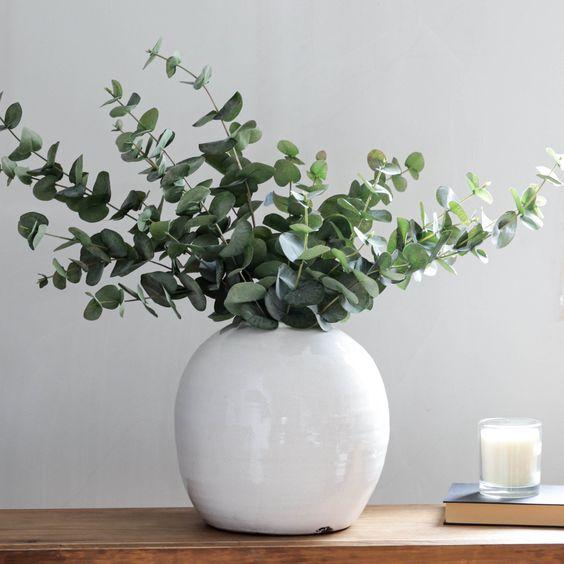 Eucalyptus
Eucalyptus
Image Source: Pinterest
Eucalyptus plants are valued for their aromatic leaves and therapeutic properties. Here's an expansion on their symbolism and benefits:
Symbolism and Benefits
- Healing and Well-Being: Eucalyptus is known for its healing properties, particularly its essential oil, which is used in aromatherapy for respiratory relief, relaxation, and promoting a sense of well-being.
- Negative Energy Warding: Eucalyptus is believed to ward off negative energy and purify the atmosphere. Its fresh scent can create a calming and uplifting environment.
- Culinary and Medicinal Uses: Eucalyptus leaves are also used in cooking, herbal teas, and natural remedies for their antibacterial and antiseptic properties.
- Aesthetic Appeal: Eucalyptus branches and leaves add a touch of natural beauty to indoor spaces. They can be used in floral arrangements or dried for decorative purposes.
Care Tips
- Light and Watering: Eucalyptus plants prefer full sun or bright, indirect light. Water them regularly but avoid overwatering to prevent root rot.
- Pruning: Trim eucalyptus branches as needed to maintain size and shape. Prune away any dead or diseased parts to promote healthy growth.
- Harvesting: Harvest eucalyptus leaves for aromatherapy, herbal remedies, or decorative purposes. Dry the leaves in a well-ventilated area for use in potpourri or sachets.
Chrysanthemum
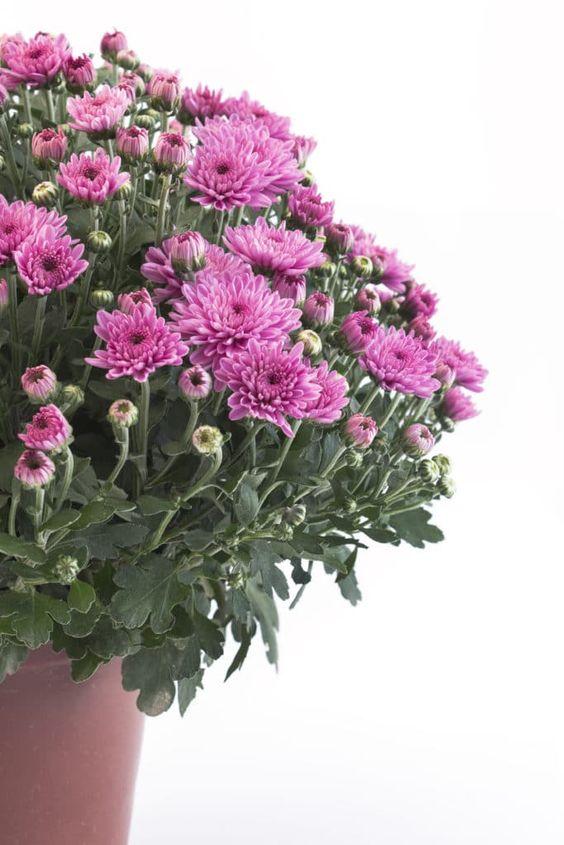 Chrysanthemum
Chrysanthemum
Image Source: Pinterest
Chrysanthemums, commonly known as mums, are cherished for their colorful and vibrant flowers. Here's an expansion on their symbolism and benefits:
Symbolism and Benefits
- Long Life and Happiness: Chrysanthemums symbolize long life, joy, and happiness in many cultures. They are often associated with positive energy and celebrations.
- Positive Energy: The vibrant colors of chrysanthemum flowers bring positive energy and uplift moods. They are perfect for adding a cheerful touch to homes and gardens.
- Aesthetic Beauty: Chrysanthemums come in a variety of colors and flower shapes, making them versatile for floral arrangements, bouquets, and garden displays.
- Easy to Grow: Chrysanthemums are relatively easy to grow and can thrive in both indoor and outdoor settings with proper care.
Care Tips
- Light and Watering: Chrysanthemums prefer full sun to partial shade and well-draining soil. Water them regularly, keeping the soil evenly moist but not waterlogged.
- Deadheading: Remove faded or spent flowers (deadheading) to encourage continuous blooming and maintain the plant's appearance.
- Overwintering: In colder climates, protect outdoor chrysanthemums from frost. Consider overwintering them indoors or providing frost protection if necessary.
- Fertilization: Feed chrysanthemums with a balanced fertilizer during the growing season to support healthy growth and abundant flowering.
Dwarf Banana Plant
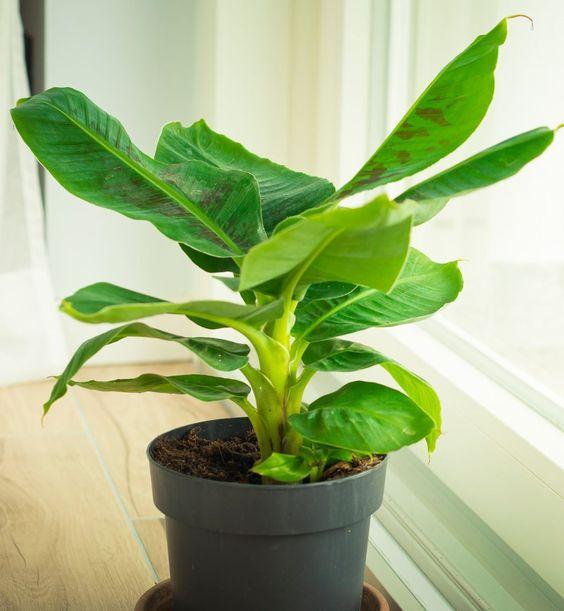 Dwarf Banana Plant
Dwarf Banana Plant
Image Source: Pinterest
Dwarf Banana Plants are not only exotic and decorative but also carry symbolic meanings and practical benefits. Here's an expansion on their symbolism and advantages:
Symbolism and Benefits
- Wealth and Abundance: Dwarf Banana Plants are associated with wealth, abundance, and prosperity in many cultures. Their lush foliage and fruiting ability symbolize fertility, growth, and prosperity.
- Tropical Ambiance: Dwarf Banana Plants add a tropical and exotic feel to indoor or outdoor spaces. Their large, paddle-shaped leaves create a dramatic and lush appearance.
- Edible Fruits: While dwarf varieties may not produce full-sized bananas, they can still bear small, edible fruit in suitable conditions. This adds a fun and unique element to your plant collection.
- Aesthetic Appeal: Beyond their symbolism, Dwarf Banana Plants are visually striking and make impressive focal points in gardens, conservatories, or large indoor spaces.
Care Tips
- Light and Temperature: Dwarf Banana Plants thrive in bright, indirect light and warm temperatures. They prefer temperatures between 65°F to 85°F (18°C to 29°C) and high humidity.
- Watering and Soil: Keep the soil consistently moist but not waterlogged. Provide good drainage to prevent root rot. Mist the leaves occasionally to increase humidity.
- Fertilization: Feed Dwarf Banana Plants with a balanced fertilizer during the growing season to support healthy growth and fruiting. Follow package instructions for dilution and frequency.
- Pruning: Trim yellow or damaged leaves as needed. Remove spent flower stalks or fruit clusters to encourage new growth and prevent energy loss.
- Support: Depending on the variety, Dwarf Banana Plants may benefit from staking or support for their heavy leaves and fruit clusters.
Ficus Tree (Ficus Benjamina)
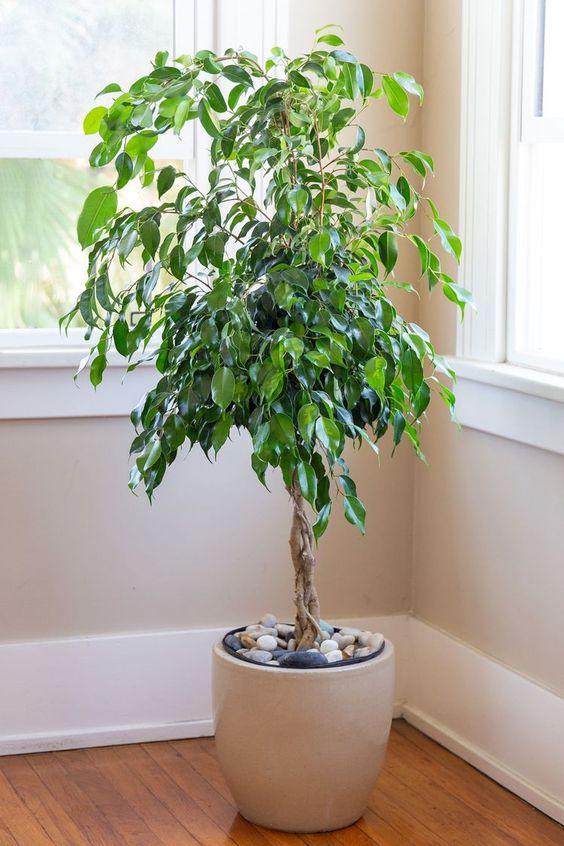 Ficus Tree
Ficus Tree
Image Source: Pinterest
Ficus Trees, particularly Ficus Benjamina, are elegant and versatile plants known for their symbolism and aesthetic appeal. Here's an expansion on their symbolism and benefits:
Symbolism and Benefits
- Wealth and Prosperity: Ficus Trees, especially Ficus Benjamina, are believed to attract wealth, prosperity, and positive energy according to Feng Shui and cultural beliefs. Their lush foliage symbolizes abundance and growth.
- Natural Beauty: Ficus Trees have glossy, leathery leaves and a graceful growth habit that adds a touch of nature and elegance to any space. They are popular as indoor trees or specimen plants.
- Air-Purifying Qualities: Ficus Trees are effective air purifiers, helping remove indoor pollutants and improve air quality. This contributes to a healthier environment and promotes well-being.
- Versatility: Ficus Trees come in various sizes, from small potted plants to large indoor trees. They can be shaped into topiaries, trained as standards, or left to grow naturally as a statement piece.
Care Tips
- Light and Temperature: Ficus Trees prefer bright, indirect light but can tolerate moderate light conditions. Protect them from drafts and sudden temperature changes, as they prefer stable conditions.
- Watering and Humidity: Keep the soil evenly moist but not waterlogged. Allow the top inch of soil to dry before watering again. Maintain moderate humidity levels for optimal growth.
- Pruning and Maintenance: Prune Ficus Trees to maintain their shape, remove dead or yellowing leaves, and promote bushy growth. Wipe the leaves occasionally to keep them free of dust.
- Potting and Repotting: Use well-draining soil and a container with drainage holes. Repot Ficus Trees as needed to provide room for root growth, typically every 2-3 years or when the plant becomes root-bound.
Conclusion
Incorporating these Feng Shui-approved plants into your indoor spaces can bring good luck, prosperity, and a harmonious environment. Whether you're looking to attract wealth, health, or happiness, these plants offer a natural way to enhance the positive energy in your home or office.
By understanding and utilizing the principles of Feng Shui, you can create a balanced and flourishing environment that supports your well-being and success. Happy planting!
explore further
Latest from Contemporary ideas
More from Innovations
Resources
Dwello, for every home buyer, is a way to go from 'I feel' to 'I know', at no extra cost.


